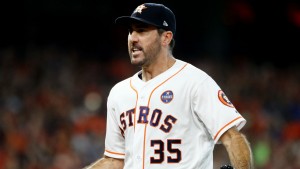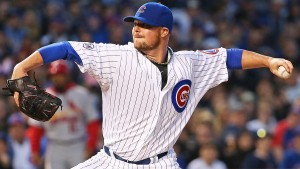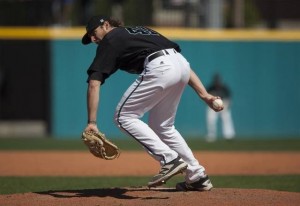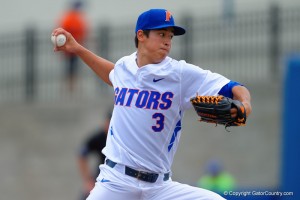So, I try to do this every year, and every year I do reasonably well in predicting the end-of-season awards as voted upon by the media members of the BBWAA.
This year? I have no idea what is going to happen. A combination of work, pandemic, side projects and other interests has really taken away from my focus on baseball in 2020. So honestly I have no idea who is set to win these awards. But lets do some educated guessing, with the help of some of my favorite national baseball writers.
AL MVP: Well, if you use the old adage “best player on the best team,” you end up with Brandon Lowe on the Tampa Bay Rays. Is Brandon Lowe getting MVP buzz? Of course not. Could you pick Brandon Lowe out of a lineup? Yeah me neither. He’s the only guy on the Rays who hit double digit homers but he’s hitting just .269 on the season and posted a 2.1 bWAR, nearly a full win below some of his compatriots in the league. Tampa is a team effort with great starters and even better relievers that probably won’t go far in the playoffs.
No, this award seems to be coming down between two hitters:
– D.J. LeMahieu of the Yankees, who had a monster batting season and really carried a team that was missing its two best hitters for half the season.
– Jose Abreu, who also blew up this year, hitting .317 with 19 homers in 60 games to lead the resurgent and dangerous White Sox into the playoffs for the first time in more than a decade.
I like the Abreu narrative. I’ll go Abreu 1, LeMahieu 2 and Trout getting sympathy 3rd place votes for yet another playoff-less season for the Angels. Cleveland’s leading slugger Jose Ramirez continues to mash in anonymity and should be in the conversation for 3rd here as well.
NL MVP: well, its pretty clear that the three best hitters this year in the league were all in the NL. Freddie Freeman, who has never finished in the top 3 in MVP voting amazingly, blew up this year, posting an OPS figure above 1,100 and really continuing to show why he’s consistently year in, year out one of the most underrated hitters in the league. Meanwhile, Mookie Betts quietly led the league in bWAR with a 3.4 figure in just 60 games (that’s projecting to a 9-win season in a full year), but a good chunk of that WAR is defense-related (which some writers struggle to evaluate). Lastly you have our own Juan Soto, who just put up a 212 OPS+ season (the 26th best single season OPS+ figure EVER), became the youngest player to ever lead the league in BA, and posted 2.9 offensive bWAR in just *47 games* (that’s a 10-win offensive season projected to 162 games, before taking away his defensive correction which drags him down from an overall bWAR perspective). And none of this even recognizes any of the guys in San Diego (specifically Fernando Tatis Jror Manny Machado) who have rocketed that team to respectability quickly.
Honestly, I think the narrative gets Freeman the award, given that he’s never come close to winning it anymore. The award goes Freeman 1, Betts 2 and Soto 3. Maybe Tatis takes 3rd over Soto, penalizing the Nat for his false-positive Covid test that cost him a chunk of the season.
AL Cy Young: I think it has to be Cleveland’s Shane Bieber, who gets the pitching “triple crown” in the AL: he leads the league in Wins (8), ERA (1.63) and Strikeouts (122, which worked out to an astounding 14.2 K/9 rate). His ERA+ figure was 281, good for the 3rd best single season figure … EVER.
I’m not even sure who fills out the rest of the AL bracket: perhaps Toronto’s Hyung-Jin Ryu 2nd for his solid performance in his debut Toronto season, and then Dallas Keuchel, who posted a sub 2.00 ERA for the White Sox.
NL Cy Young: this race is a mess. If it were me, i’d be seriously considering Max Fried of Atlanta, who was basically unhittable all year (7-0, 2.25 ERA), but who got hurt and did not pitch enough innings to even qualify for the ERA title. But Cincinnati’s Trevor Bauer was even more unhittable, posting some astounding numbers this year: just 5-4 as a W/L record but his ERA was a league leading 1.73, he also led the league in WHIP with an amazing 0.795 figure, he posted a 276 ERA+ (the 5th best seasonal figure ever), and he struck out 12.3 K/9. Just amazing.
I think it goes Bauer 1, Fried 2 and then someone like Yu Darvish or Jacob deGrom 3rd, to recognize their excellent seasons as well.
AL Rookie of the Year: who knows: there’s been so many debuts this season, it has been hard to keep track. I’ll go with who I see getting more sportswriters buzz; Kyle Lewis of Seattle.
NL Rookie of the Year: I think the narrative gives it to San Diego’s Jake Croneworth, who exploded out of nowhere to have a solid rookie season at the age of 26. Yes, there’s some eye popping figures coming from Milwaukee rookie reliever Devin Williams (53 strikeouts of 100 batters faced, or a 17.7 K/9 rate, good for an ERA+ of … get this …. 1375!), but he’s a middle reliever. we’ll see how the voters evaluate him.
Managers of the Year: how do you possibly evaluate managers in a short season like this? I default to “manager of the team that surprised people the most and snuck into the playoffs.” Following this theory i’ll go Rick Renteria of the White Sox in the AL(who improved from going 72-89 last year to 35-25 this year) and Don Mattingly of the Marlins in the NL (whose Marlins won just 57 games last year). San Diego’s Jayce Tingler deserves votes here too, as does Cincinnati’s David Bell.
There you have it.
Post publishing Actuals:
For 2020, I got 6 out of 8 predictions right. Missed on one RoY and one Manager.
- RoYs: Devin Williams and Kyle Lewis.
- Managers: Don Mattingly and Kevin Cash. Amazingly, the guy i thought would win was *fired* a few days before he was named a finalist. Not since Davey Johnson and the Orioles in 1997 have we seen something like this.
- Cy Youngs: Trevor Bauer and Shane Bieber
- MVPs: Jose Abreu and Freddie Freeman



